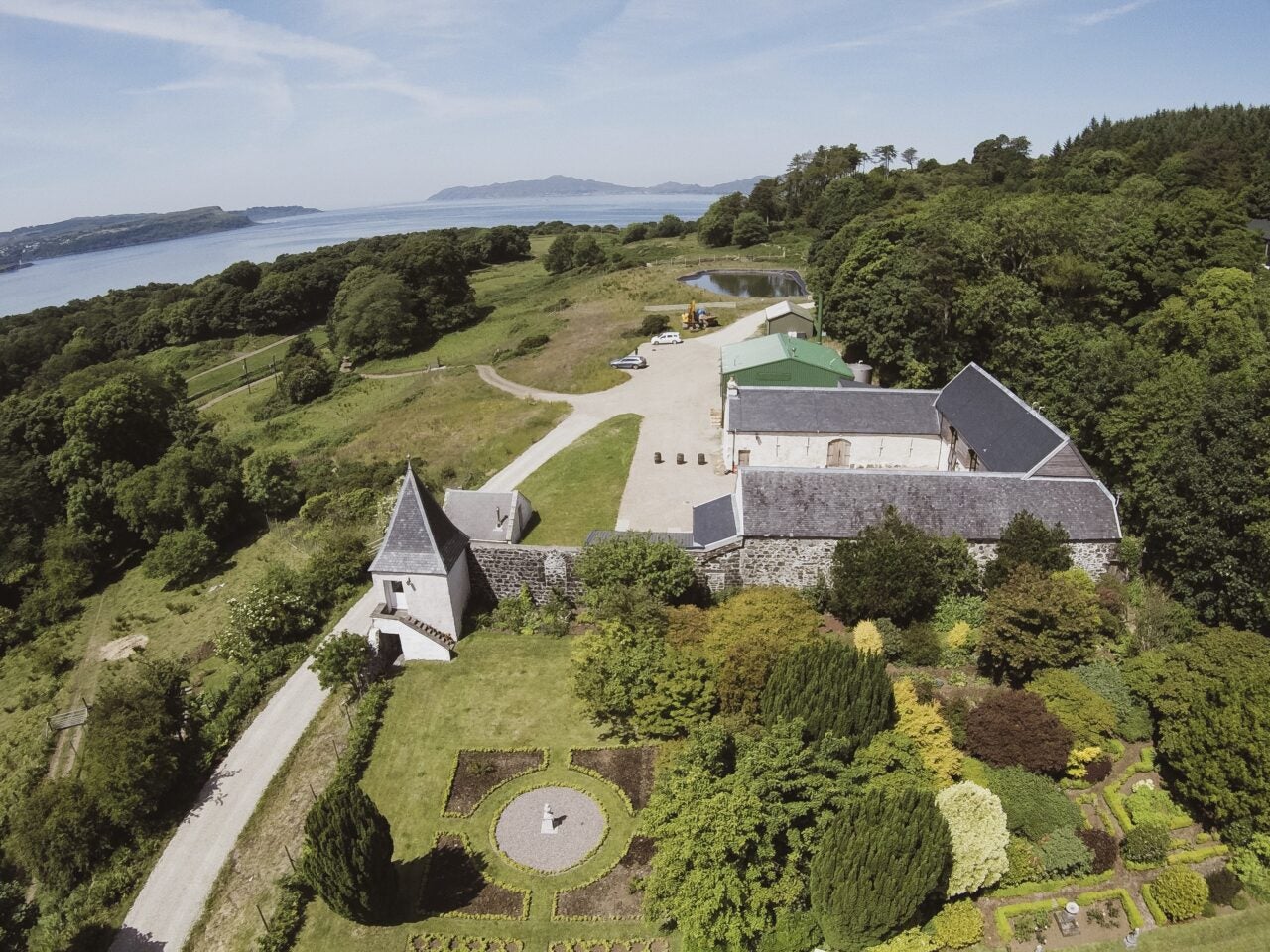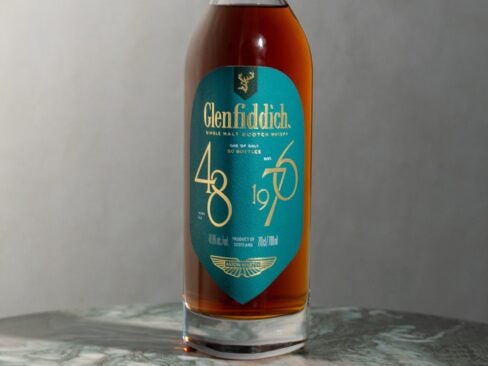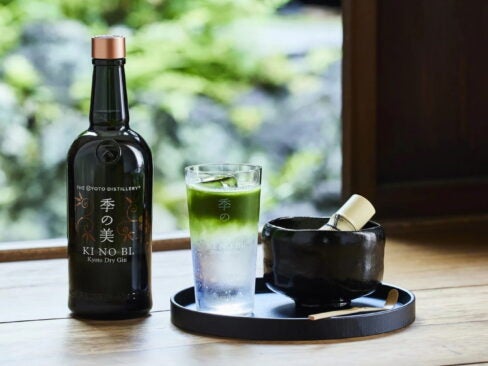On November 1, world leaders, policymakers and activists will descend on Glasgow in the hope of agreeing new action to meet world climate change targets. But with all eyes on Scotland, we look at the growing efforts to make its most famous export – Scotch whisky – more sustainable.
The Scotch whisky industry is a significant contributor to the country’s carbon footprint. Data from the UK government shows that Moray, which is home to around 50 distilleries in the Speyside region, has the highest per capita carbon emissions in Scotland.
In 2019, Moray’s emissions amounted to 7.5 tonnes of CO2 per person. Of the total 722 kilotonnes of Co2 from Moray that the local authority has control over, a third came from industry.
[See also: Unusual Methods Making Wine and Spirits Sustainable]
!function(){“use strict”;window.addEventListener(“message”,(function(e){if(void 0!==e.data[“datawrapper-height”]){var t=document.querySelectorAll(“iframe”);for(var a in e.data[“datawrapper-height”])for(var r=0;r<t.length;r++){if(t[r].contentWindow===e.source)t[r].style.height=e.data["datawrapper-height"][a]+"px"}}}))}();
The UK government recognizes the importance of reducing the carbon footprint of distilleries, in 2020 it announced £10m ($13.72m) in research and development funding to help distilleries go green. In January 2021, the Scotch Whisky Association announced its revised sustainability strategy, committing to reaching net zero across the industry by 2040.
And some companies are taking it further. Over the past few years, Nc’nean has made a name for itself as the first net zero Scotch whisky distillery, and in 2020 its inaugural bottle sold for a record $53,000 at auction.
Annabel Thomas, Nc’nean’s founder and CEO says that Scotch, as a product so closely tied to Scottish nature but also so energy intensive, has a particular duty to the environment. And, she adds, Scotch may need to adapt or risk losing its consumer base.
“Whisky has got such an amazing reputation for quality and heritage and tradition, but we have got to move with the times and keep attracting the next generation,” she says. “We need to be talking to the younger consumer, who really cares about things like sustainability.”
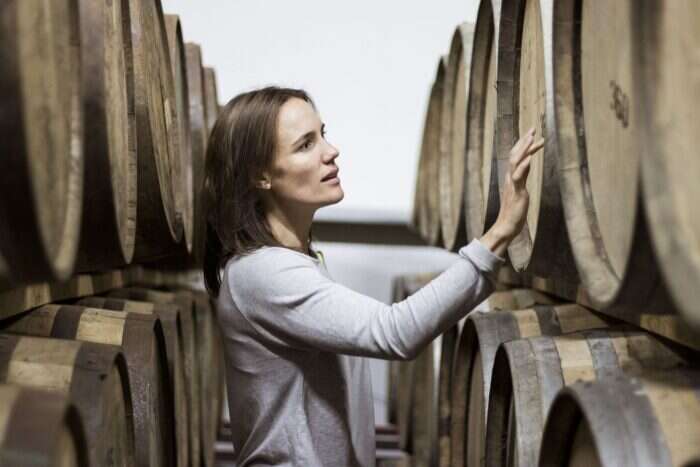
Founder Annabel Thomas with casks / ©Nc’nean
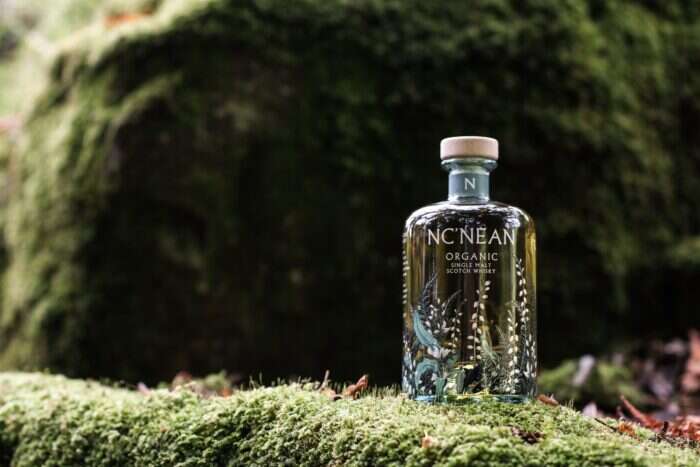
Nc’nean’s bottle is made with 100% recycled material / ©Nc’nean
Nc’nean is powered by a biomass boiler rather than fossil fuels, and they use organic barley so that the biodiversity of the farming areas isn’t impacted by chemicals and pesticides. Its packaging is 100% recycled clear glass.
After all their reductions, in 2020 Nc’nean produced just 267.5 tonnes of CO2 from their distillery operations and supply chain, which they offset with Highland Carbon. This equates to 2.54 kg CO2 per liter, or 1.44kg per bottle.
But Nc’nean wants to take it further – and become net zero across their supply chains, not just their own operations. In each bottle, a third of the carbon footprint comes from barley farming and processing, and almost another third comes from haulage, areas which are much harder for Nc’nean to directly control.
[See also: The Prince Edward Cocktail by Nc’nean Distillery]
!function(){“use strict”;window.addEventListener(“message”,(function(e){if(void 0!==e.data[“datawrapper-height”]){var t=document.querySelectorAll(“iframe”);for(var a in e.data[“datawrapper-height”])for(var r=0;r<t.length;r++){if(t[r].contentWindow===e.source)t[r].style.height=e.data["datawrapper-height"][a]+"px"}}}))}();
“Our first goal was to get to net zero for our own operations, and we got to that by March 2020, but the next most important step is to get to net zero for all of our supply chains, and we want to do that by 2030,” Thomas says. “And that is an awful lot harder because we’re not in direct control of our supply chain, so we need to work with all our farmers, suppliers and providers.”.
Nc’nean also wants to encourage a cultural shift away from gift-boxes, which are still very popular particularly in Europe. In the past year, demand for gift boxes from customers purchasing directly from the Nc’nean website has gone from 80% to 15%, which Nc’nean hopes will be strong evidence to encourage their European distributors to opt out too.
But Thomas recognizes Nc’nean accounts for a tiny part of the enormous industry. Reaching the SWA’s net zero goal will take drastic moves from the major figures in the whisky industry, and clear directives and incentives from the government.
Between 2016 and 2019, Edrington, the company which owns Macallan among other Scotch whisky brands, cut its emissions by over a fifth. Emissions fell a further 25% in 2020, though this is in part due to temporary closures of distilleries due to the pandemic.
Its emissions per liter of whisky produced fell by 10% between 2019 and 2020, and almost a third of its UK energy requirements came from renewable sourcing.
!function(){“use strict”;window.addEventListener(“message”,(function(e){if(void 0!==e.data[“datawrapper-height”]){var t=document.querySelectorAll(“iframe”);for(var a in e.data[“datawrapper-height”])for(var r=0;r<t.length;r++){if(t[r].contentWindow===e.source)t[r].style.height=e.data["datawrapper-height"][a]+"px"}}}))}();
Edrington is aiming to reach zero waste to landfill, and ensure all of its packaging is recyclable and sustainably sourced by 2025. In 2021, The Macallan was awarded the Butterfly Mark from Positive Luxury for its commitment to sustainability.
“As a brand proud of our strong Scottish roots and distinguished history, we feel a deep responsibility to act with integrity to preserve our craftsmanship and mastery for future generations,” says Macallan’s senior marketing manager for sustainability, Elizabeth McMillan.
“We believe that we are in a position to lead and inspire others, driving meaningful change and building a legacy through collaboration and innovation.”
[See also: It’s Still Not Too Late to Invest in Scotch Whisky]





